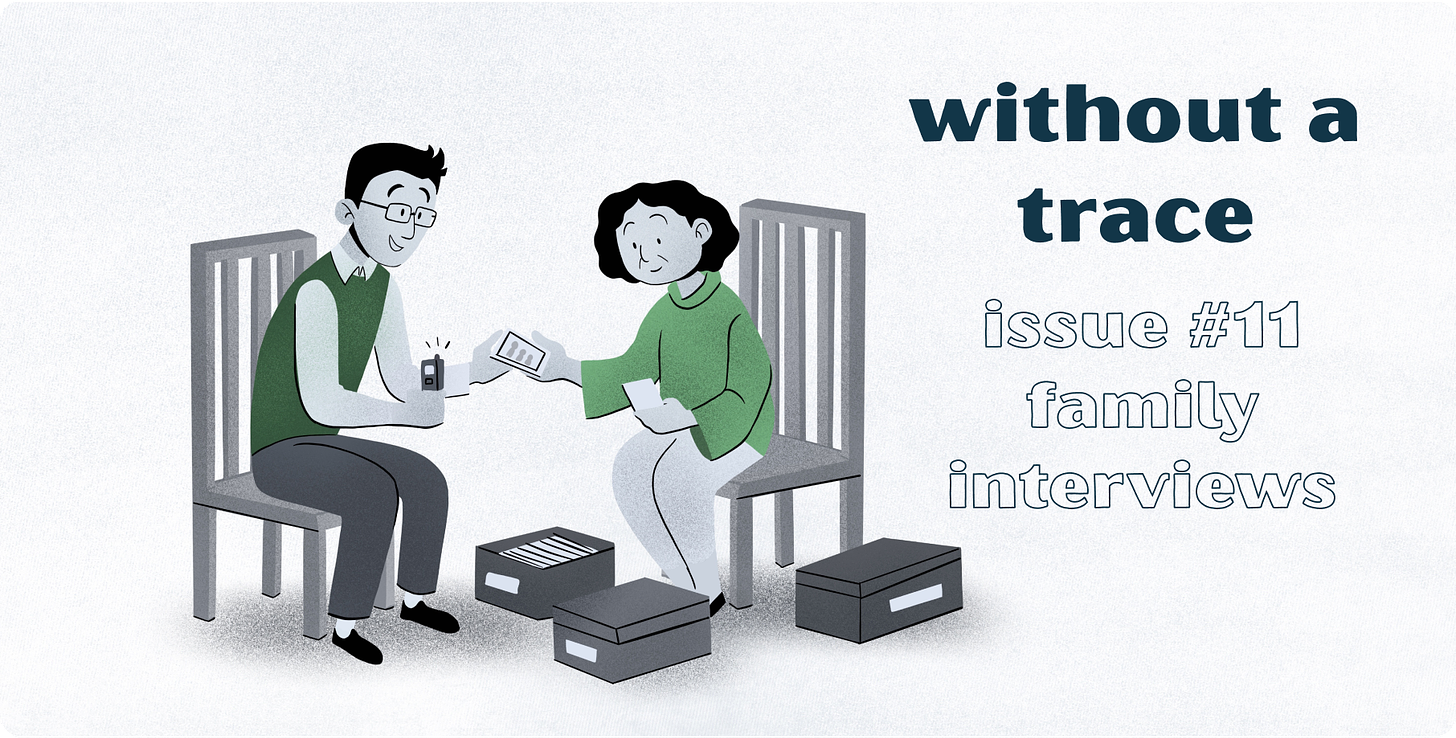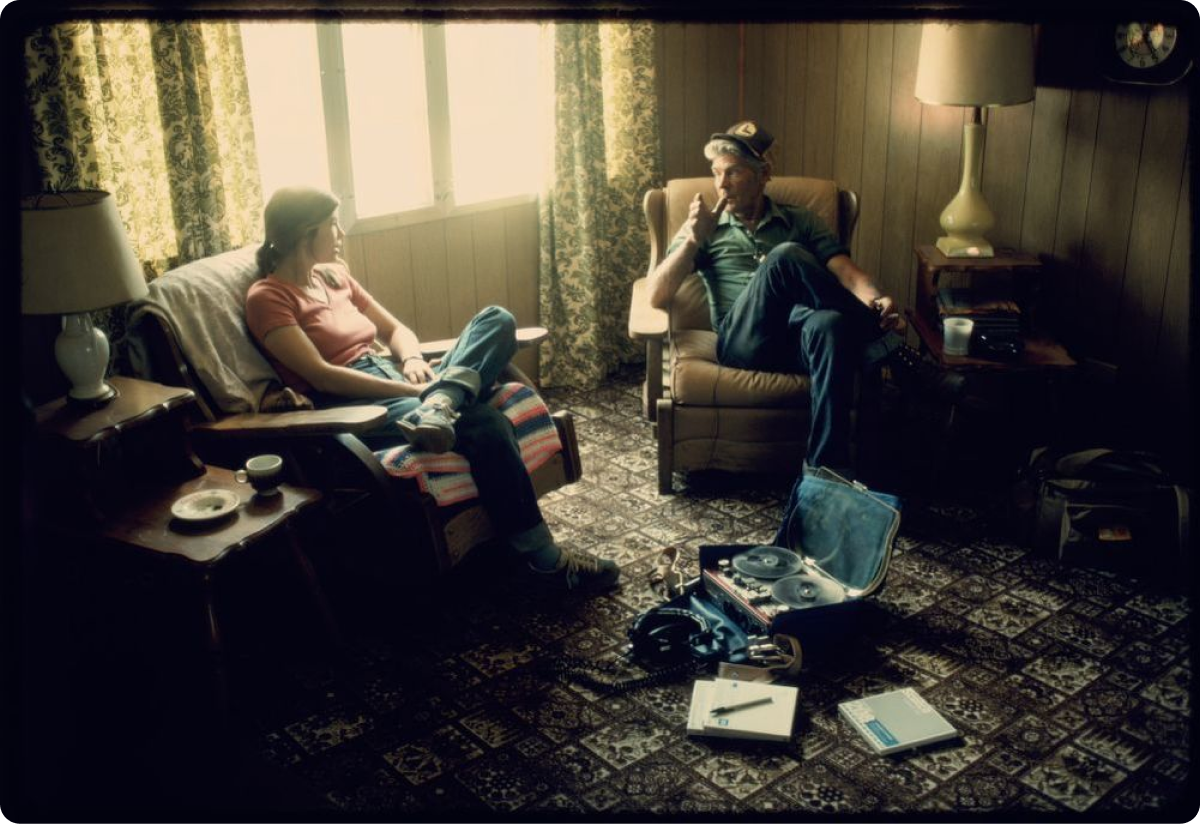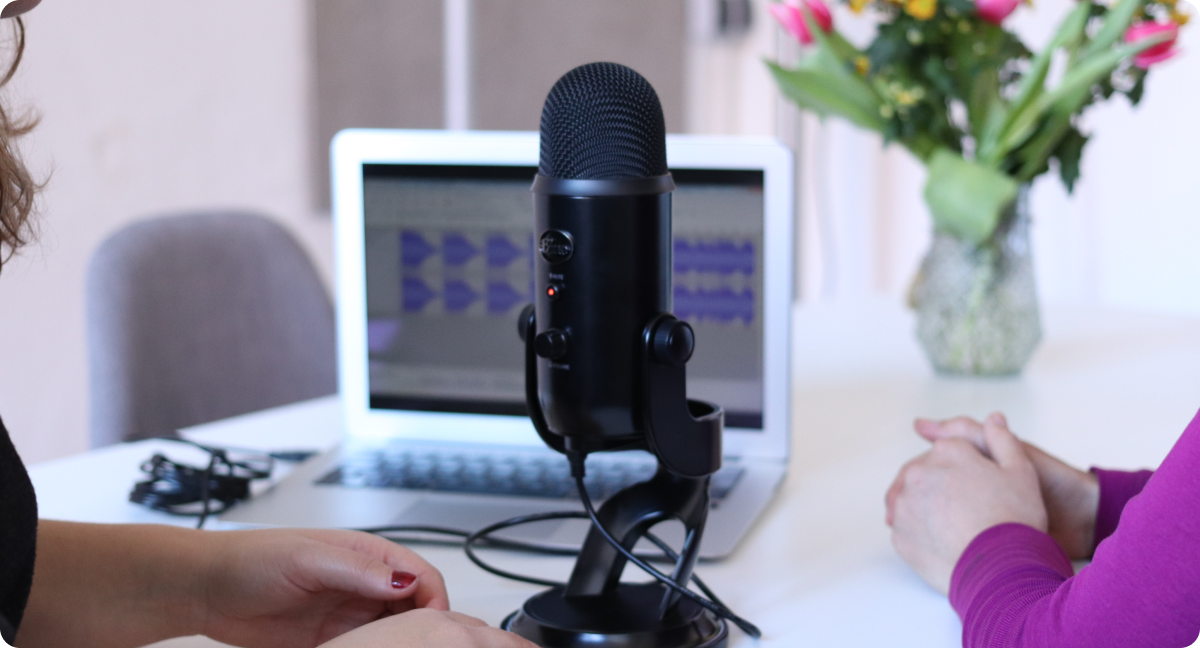The pursuit of genealogy is also the pursuit of time. When doing family research we necessarily turn to the past to reconstruct our family’s history. But the same time that erased those people and their stories is still at work right now. Don’t make the mistake of neglecting to learn about the members of your family who are still alive. Interviewing a grandparent or cousin or aunt can open up a whole new area of research you might never have known about. Below are some ideas to get you started. But don’t wait. Time won’t.
Ever wish your ancestors were a little more Type A? You know, the folks who label photographs with names and dates and maintain tidy filing systems? We all do. Even if you’re not personally inclined towards organization (probably an inherited trait), it’s never too late to start.
There’s a lot you can do right now to make your family’s history easier for your descendants to access and understand. One is interviewing your living relatives. If you’re nervous at the prospect, just think of it as a conversation, not an interview. And we have some pro tips to get the best out of relatives who may be shy or unsure what to talk about.
Advance Planning Getting some of the work done before you sit down to talk (whether in person or via phone/computer) can really help you both feel more relaxed. For the interviewer, this means doing some research about the family and establishing what you already know. Familiarize yourself with the section of your family tree that’s pertinent to your relative, so you’ll be more likely to recognize names of distant cousins. You might also send some questions to your relative in advance, so they have some material ready when they sit down with you.
Old Photos One of the easiest ways to get people talking is to show them old photographs of themselves and people they recognize. If you have old, unlabeled photos, bring those to the interview and ask your relative if they can fill in the names and dates. Generally, seeing old photos relaxes people and is a great conversation starter.
Prepare a List of Questions Knowing what you’re going to talk about will make the experience more relaxed and more productive. We’ve provided some below and there are plenty more examples on the Internet, so peruse some of those and create a list of questions that makes sense for your interview. Keep in mind that it’s better to have too many questions than too few--but it’s also OK to not get to every question. With that in mind, prioritize your areas of interest to make sure they get covered. And consider the ordering of questions. Start with factual questions about people and place names and then once your relative has relaxed a little, start on the questions that might be more delicate or emotional.
Listening This tip is the simplest but may be the hardest to do well: stop talking! Yes, your interviewee will probably start answering one of your questions, then go off on a tangent about some other family story--let them! Sit back and listen to the stories they remember best. And when there’s a pause in the conversation, try not to fill it with talking, but do what professional interviewers do: let the silence remain. Your interviewee will be likely to want to fill that silence, too. When they do, you may get an entirely new family memory out of it!
Family Heirlooms Like an old black and white photo, an actual physical memento, such as a piece of art or a toy that’s been in the family for years, can also inspire your subject to open up about childhood memories and stories that pertain to the object itself. Be sure to ask your relative if they own (or know of) a family bible or family scrapbook where important names and dates of ancestors might be recorded. Even if they don’t have it, they might know which cousin does.
Lastly, manage your expectations. Understand that it’s easier for some people to talk about their lives than others. Be prepared for your interviewee to get emotional, and be supportive in every way you can. Record the conversation (with your subject’s permission) so you can focus on talking, not on taking notes. Remember you’re there not as a genealogist, but as a member of the family. And when you’re finished, the interview itself will be another important part of your own memories that you can pass down to the next generation.
Weekly Discoveries 🔎
Alternatives to the paid subscription site can be found in the article, Should you buy an Ancestry subscription?
If you’re just getting started in researching your family history, don’t miss the upcoming “The Research Process: An Introduction,” being presented next month by FamilySearch.
Research your Native American heritage with the new collection, U.S., Native American, Eastern Cherokee Indian Reservation Rolls, 1848-1970.
Shaking Hands, Hugs, & Kisses Will Have to Wait, but Smiles, Laughter, and Excitement Don’t Have to! Learn how to stay safe and connected this holiday season with free family history & family reunion tutorial videos.
Free webinar exploring oral tradition with Tips for Interviewing Relatives.
The Magic of a Thoughtful Question
It’s not always easy getting our loved ones to divulge their best stories. They might not think the event or story is significant enough, or they assume everyone already knows the family lore. Sometimes an important event is not even remembered until sparked by a thoughtful question.
Here are some Basic Questions to get started:
Basic Questions:
What was your birth name?
When and where were you born?
Who were your parents?
Did you have any siblings?
Who were your grandparents?
When and where were you married?
How many children did you have and what were their names?
If you’re reading this, you’re probably the “official keeper” of your family tree, so you know these Basic Questions are merely a starting point. The answers to the Basic Questions detail the vital facts and milestone events of an individual, but aren’t we all more than a beginning and an end, with a few milestones sprinkled in between? We are a sum of all the events of our lives, big and small, as well as our successes and failures . In order to better understand the stories of our loved ones, we should dig deeper. Here are some suggestions:
Story-prompting Questions:
What was your nickname growing up?
Were you named after a relative?
Was your family religious? Did they attend worship services together? How did you dress to attend services?
What did your parents do for a living? What about your grandparents?
What were your parents like? What was their relationship like?
What did you call your grandparents? Did they live nearby?
Do you remember any of your great-grandparents?
What was your favorite meal that your family ate? Did you eat in the dining room or the kitchen? What did the table look like?
What did your home look like growing up? Was it in a city or rural area? What was your bedroom like?
Did you have any pets growing up?
What is your earliest childhood memory?
What was the first movie you remember going to the theater to see? Who were you with? Did you have snacks? What did it cost to see a movie?
Did your mother or father have a favorite saying that they repeated often?
Did you have a lot of chores growing up?
Did you do well in school? What were your favorite subjects? Did you ride a bus or walk to school?
Who was your best childhood friend? What types of games did you play?
Who taught you how to drive? What was your first car?
Growing up, did you have visitors often?
Did you have any childhood fears?
Did your family celebrate birthdays? Did you have a party? Were cake and decorations involved?
Did your family celebrate Christmas (or Hannukah)? Did you have a tree? How was it decorated? What were the gifts like? What was your favorite gift you received?
Have you had any significant illnesses or injuries? What about your family members?
What did you want to be when you grew up, and why?
Did your family have a television growing up? What were your favorite shows? Did you watch a lot of television together as a family?
When was your first date with your future spouse? What did you do?
How did you or your spouse propose? Was there a ring?
How did you feel when you first learned you were going to be a parent?
How did you pick the names of your children?
How did you learn you were going to be a grandparent for the first time? How did you feel?
What was your first job? What’s the best job you ever had?
What are you good at? Any hobbies or special skills? Languages?
Did any of your family members have any special skills or unique talents?
Do you have any family heirlooms that you hold dear? Why is this particular piece so special to you?
As an adult, what has been your favorite form of entertainment?
Special Interest Questions:
Were you alive during the Great Depression? How did it affect your family?
Do you remember where you were when XX [insert event, e.g., moon landing, death of JFK, Pearl Harbor, etc] happened?
Which president have you admired most in your lifetime? Why?
What is the favorite place you have ever traveled?
Were you ever involved in any natural disasters?
Do you know any interesting stories about other relatives? A notorious relative, perhaps, or a hero?
Military-related Questions:
Were you in the military? What branch?
Did you enlist or were you drafted?
When were you sworn in and when were you discharged?
What was your rank when enlisting and when discharged?
How did your family feel about your service?
How did you feel leaving your family behind?
Where was basic training? What was it like?
Where were you stationed? What was it like there?
What were your duties?
Were you involved in any war or conflict? If so, when did you first see combat?
Did you receive any medals or special recognitions?
What did your uniform look like?
Did you write a lot of letters? Who did you send them to?
What did homecoming feel like for you?
Thought-provoking Questions:
Do you have any advice for future generations?
What’s the best advice you ever received?
What’s your favorite book, and why?
How is the world different today than when you were a child?
How is your home now different from the home you raised your family in and your childhood home?
What was the most difficult thing you ever had to do in your life?
What haven’t you had enough of in your life? Time? Money? Love?
Did you feel there was one person or event that changed the course of your life?
What is the single most memorable moment of your life?
You can learn more about interviewing your family in our blog post, Oral History: Beginner’s Guide to Interviewing Your Family
Past Issues Worth Reading 🗞
Field Guide: Decoding Old Cemeteries - Read Here
The First Black Friday: September 24, 1869 - Read Here
Why We Eat Turkey on Thanksgiving - Read Here
DNA: The Real You? - Read Here
What the “Great War” Taught Us - Read Here
Record Remains of a Pandemic - Read Here
Hiraeth: When “The Old Country” No Longer Exists - Read Here
The most helpful newsletter, delivered with 💛 every Friday morning:
Sources….Duh!!
Library of Congress, “Interview in Nichols's Mobile Home,” database with images, Library of Congress (https://www.loc.gov/ : accessed 9 December 2020), image of photographic print, digital ID ppmsca.12856afc96ran.44336; citing, Prints and Photographs Division, Library of Congress, Washington, D.C.
End of Email Prize! 🥳
Another week down and you made it to the bottom of this email. We’re really proud of you, seriously. Ever wanted to feel like a programmer? Click the link below and start typing anything:
Bye now!





